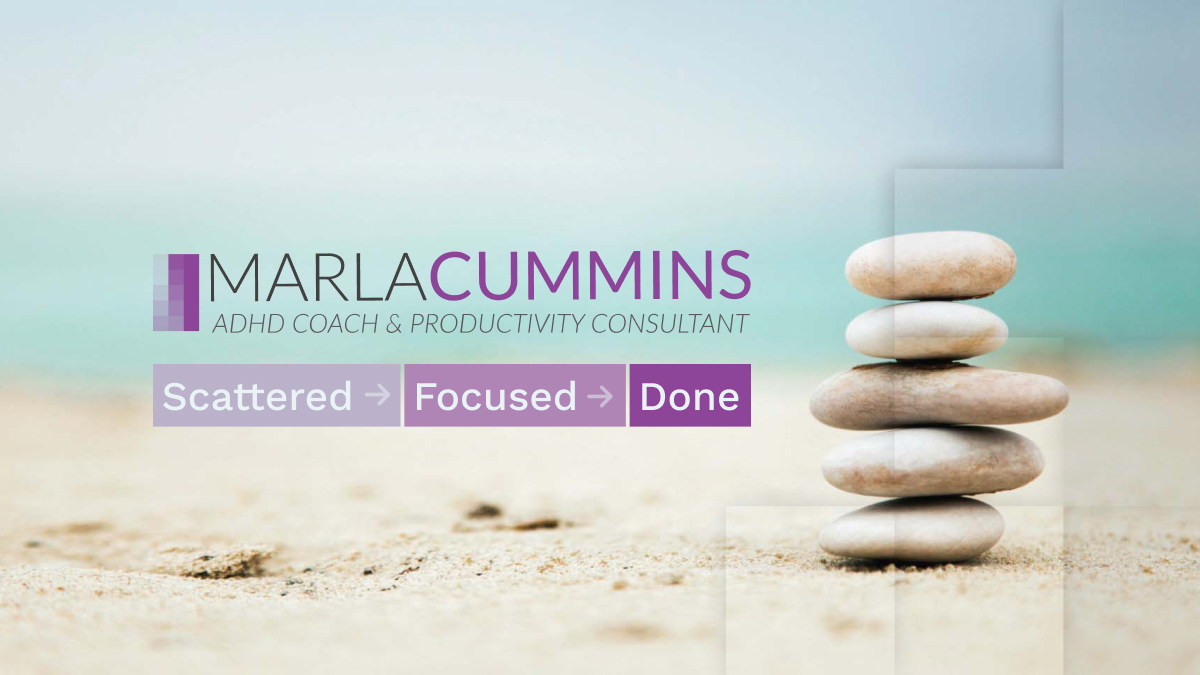How ADHD Adults Can Stay Focused on Long Term Projects

I recently received the comment below asking how ADHD adults execute big projects.
I am interested in how to maintain interest and progress for long projects. I am great at starting projects (lots of enthusiasm, love the creativity in planning a project), but then I lose interest and I get boooored and start avoiding it. Once I am bored I am easily distracted (by writing this email, as an example). As a result I usually do it all in the last few days under an adrenaline rush, and am often late. I am good at organizing, I try to do lots of small projects instead of large ones, I can break projects down into smaller tasks, but occasionally I must work on a long writing project, and it is a struggle.
And I know many of you, after reading this, are probably thinking, “I could have written that!” I also thought you would be interested in the answer to the question.
So, read on below where I’ll share some ideas on how you can persist in working toward your longer term goals.
What You May Do When You Are Bored
First, a reminder. As an adult with ADHD your challenge is not a lack of attention. In fact, you have a surplus of attention, really.
The challenge for you is attending to the right thing at the right time. And when you are feeling bored this is even harder for you.
So, instead you may…
- do work that is not important, but easy.
- hyperfocus on whatever draws your attention.
- mindlessly surf the internet or watch TV.
- spend more time than you intend in another activity.
- use drugs or alcohol.
- sleep more than you need.
- eat too much.
- flit from activity to activity.
- other?
Your attention is on something, for sure, but not necessarily on what is important to you.
How Your Boredom Is Related To The Reward Being Too Distant
First, it is important to recognize that no matter how excited you are about a project at the onset or how important it is to you, you can expect your interest to ebb and flow over the long term. Happens.
A rudimentary understanding of the brain’s reward system is a good place to start to understand why this can happen.
In simplified terms we make choices and prioritize goals when a sensory stimulus is sent and processed in the brain indicating a reward is on the way. When a reward is anticipated dopamine is released to various parts of the brain, which activates our motor functions, attention and memory pathway. But, in the ADHD brain, because there an imbalance of dopamine and other neurotransmitters, the messages are not transmitted efficiently.
In addition, when the memory of this stimulus and associated reward is in place we will be more likely to tackle the task next time. But, because of weak working and long term memory challenges, adults with ADHD tend to live too much in the present at the expense of remembering and effectively working toward longer term goals. It may often seem that there is now and not now.
When the reward is concrete it is easy to work because we are motivated by the obvious anticipated reward. So, here is what may happen in the moment when you think about working on your longer term goals (e.g. business plan, financial planning, work project etc.) where the reward is further in the future.
- As you are walking to your desk you look at the bathroom, and think, “I should clean the bathroom. Then I’ll work on…”
- Then just when you are ready to work you receive a Facebook notification and decide, “I need a break before I start…”
- While looking at FB an email pops up, and you think, “Wow, look at all those emails! I really need to answer those before doing…”
When deciding to clean the bathroom, look at FB or plow through your emails the stimulus is right in front of you and the reward is immediate.
But, because the reward for working on a longer term goal is not so obvious or immediate, you just don’t feel like doing it. So you don’t.
How ADHD Adults Can Remember “The Reward” In Order To Persist Toward Long Term Goals
As Dr. Thomas Brown points out in his book, “A New Understanding of ADHD,” the challenges you may have with executive functions are situationally variable. That is, if you either have a strong interest or fear of an unpleasant result, you may be able to better use your executive functions.
But when your interest wanes you may be tempted to conclude, “This must not be that important to me.” Resist this temptation. Because your lack of interest does not necessarily indicate that the project is not important for you. Rather, your ADHD can make it hard to persist even when something is really important.
Above all, what will help Adults with ADHD persist over the long haul in spite of the ebbs and flows of variations in daily energy is a visceral connection to your goal.
But, as you know, a common challenge for Adults with ADHD is remembering to remember. In the moment of choice — the moment when you are choosing whether to do a task or not — you may forget how important it is for you and feel detached from the goal. This is especially true if some of the tasks associated with the project are not intrinsically interesting to you.
So, to have a visceral connection to your goal and increase your chances of remembering in the moment why it is important to you to choose to do the task:
- Create a visual of images and words and post it where you will see it.
- When you block out time on your calendar to work on the task add a message to the calendar item.
- Create an electronic visual to use as a screensaver or desktop background.
- Set an online sticky with a message you create as your default browser. So, when you go online you will see the message first.
What else can you do to help you remember in the moment why a project is important to you?
Reasons You May Still Be Bored Even When You Remember Why The Project Is Important
No doubt, you may still veer off course even when you remember how important the project is to you and are connected to the reward.
The next step is to identify other possible reasons you may feel bored by asking yourself, “Am I feeling bored because…”
- I am tired / worn out?
- while the project captures my interest, the particular task is tedious?
- I don’t have enough play in my life, and I am feeling resentful I have to work?
- I don’t have a sense of urgency because I don’t have a lot to do?
- my environment is not interesting / stimulating enough?
- in this particular moment I’m hungry?
- I’m not entirely clear what I need to do?
- some of the above and my ADHD brain wiring?!
- I didn’t take my medication?
- something else not on this list?
This list is only a starting point. Go ahead and create your own list. Then you can figure out what workarounds you can use from the list below to address your particular challenges.
How To Maintain Your Progress When You’ve Lost Your Mojo
First, notice when you are feeling bored.
Then stop, rather than defaulting to some other activity.
Check your list and figure out why you may be bored.
Then experiment with one or more of the strategies below.
- Work on an easy task so you can experience some success and, perhaps, be more willing to tackle the task you are avoiding.
- Alternatively, do the task you are avoiding first. This can help you avoid using a lot of energy thinking about, but not doing the task.
- Work with an accountability partner or body double.
- Create accountability for yourself by checking in with a supportive person on a regular basis.
- Have someone else (delegate, barter or hire) do part of the project that is hard for you or you don’t like.
- Make sure you really understand how to do each task and the steps are small enough that they feel doable. If the project is too hard or lacks clarity, you can definitely lose interest.
- Reward yourself along the way. Go for a walk after working for a certain amount of time or completing a certain amount of work. Don’t wait until the end to reward yourself.
- Set a timer for the amount of time you think you can stay focused on a particular task in order to create some sense of urgency.
- Remind yourself why it is important to you.
- Make it fun! True, not everything can be fun, but cranking up the music, for example, might make the task more enjoyable.
- Choose an environment that doesn’t have too many distractions, but enough stimuli to suit your needs. It could be a cube in a library, busy coffee shop, your office or even your patio.
- Learn to tolerate some boredom by reminding yourself of the importance of what you are doing in the long run.
- Time when you do a task to when you take your medication.
- Schedule play so you will more likely be pulled to do your work and find it interesting.
These are just a few of the tips to help you get started. I bet you can think of more.
Next Step
Your energy is going to wane. You are going to get bored. If you can expect this, you won’t be surprised and can be better prepared to figure out what to do to persist.
Choose a strategy to use to tackle an important project you are currently avoiding.

